|
|
|
Sort Order |
|
|
|
Items / Page
|
|
|
|
|
|
|
| Srl | Item |
| 1 |
ID:
148242
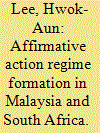

|
|
|
|
|
| Summary/Abstract |
This paper examines the formation of majority-favouring affirmative action (AA) regimes in Malaysia and South Africa. Malaysia’s Constitution premises AA on a group’s special position; South Africa’s refers to unfair discrimination. Malaysia established AA amid continuation of a political order and consolidation of executive power, while South Africa democratized and transitioned from minority to majority rule. Minority groups held less economic power in Malaysia than in South Africa. Consequently, AA in Malaysia is characterized by discretionary decision-making, and quota-based, centralized programmes, whereas South Africa has followed a legislative route involving negotiation and enforcement of target-based, statutory requirements, under less centralized oversight.
|
|
|
|
|
|
|
|
|
|
|
|
|
|
|
|
| 2 |
ID:
179014
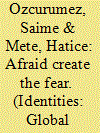

|
|
|
|
|
| Summary/Abstract |
This study investigates the perceptions of the local female population towards displaced Syrians in Turkey. The research is based on the analysis of data from participant observation and discourse analysis of conversations in five ‘gün’ groups, which are informal, social, and fairly regular gatherings of local women, in Mersin in Spring 2018. Five common discursive patterns are identified: stereotyping, biased perceptions, ‘us’ vs. ‘them’, scapegoating, and discrimination. We conclude that local women’s discourses reveal marginalisation and discursive exclusion of displaced Syrians in Turkey, and argue that such othering originates not only from existing cultural differences, language barriers, and lack of trust, but also from lack of sustained social interaction between these groups. Further studies should facilitate both knowledge sharing about the additional vulnerabilities such attitudes create for displaced people and potential paths for meaningful engagement between local community members and forcibly displaced people.
|
|
|
|
|
|
|
|
|
|
|
|
|
|
|
|
| 3 |
ID:
092397
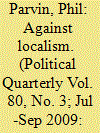

|
|
|
|
|
| Publication |
2009.
|
| Summary/Abstract |
The continued decline in levels of political engagement among British citizens has led many politicians, commentators and academics from across the political spectrum to advocate a move toward a more direct form of democracy via some kind of localism. The claim is that citizens feel increasingly estranged from the democratic process, and from those organisations on which they have historically relied to represent them within the political system. Consequently, localists argue, there now exists a gap between the people, the institutions which are supposed to work on their behalf, and the decisions made in their name, so the system needs to be reformed in such a way as to give individuals and local communities more of a direct input into the decision-making process. Calls for a more direct form of democracy via localism are popular among members of the progressive left and the 'new Conservative' right, and have become so dominant in political discourse that it is often suggested that 'we are all localists now'. This article raises questions about the localist agenda, and suggests that the adoption of a more direct form of democracy in Britain may not only fail to address the decline in political engagement, but may also result in the exclusion, marginalisation, and oppression of minority groups
|
|
|
|
|
|
|
|
|
|
|
|
|
|
|
|
| 4 |
ID:
151100
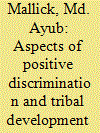

|
|
|
|
|
| Summary/Abstract |
Protective policies are essential for individual development and group mobility.
Positive discriminatory efforts seek to reduce group inequalities and to rectify
the consequences of group discrimination. Reservations in the fields of politics,
education and employment aimed at protecting tribal culture and tradition have
achieved strikingly little. Protection of land and life support system has been
poorly implemented. There have been no marked improvements in their social
conditions. Planned intervention has not improved the occupational and educational
levels of tribals. Non-tribals do not treat them equally. Apart from developing
entrepreneurship, follow-up action in providing developmental benefits to
tribals should be made. The single-stroke formula of providing loans and facilities
is unsuited to the development needs of the area. Social capital formation
is needed to ensure justice, or to provide socio-economic justice, which was
traditionally present in the tribal economy and society.
|
|
|
|
|
|
|
|
|
|
|
|
|
|
|
|
| 5 |
ID:
118225
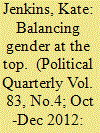

|
|
|
| 6 |
ID:
166618
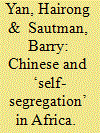

|
|
|
|
|
| Summary/Abstract |
Chinese are often said to ‘self-segregate’ in Africa. Chinese ethnocentricity is typically offered as an explanation for the putative non-interaction. Meanwhile Chinese are not compared to other non-indigenous people in Africa, implying unique Chinese self-isolation. Due to China’s semi-peripheral dynamics however, the contemporary Chinese presence in Africa cannot be generalized into a single category. Based on surveys, interviews, and documents, we examine the varied presence of Chinese in Africa, including residential patterns acquisition of local African languages, and socialization patterns, and draw distinctions between Chinese expatriates and Chinese migrants. Factors affecting Chinese adaptation include local political environment, recentness of migration, language barriers, and corporate policies to mitigate crime and conflict. We argue that most Chinese in Africa are not self-isolated and not more isolated in Africa than are other Asian migrants and whites there. Claims of Chinese self-isolation reflect a longstanding, global Yellow Peril discourse that persists despite discrediting evidence.
|
|
|
|
|
|
|
|
|
|
|
|
|
|
|
|
| 7 |
ID:
188944
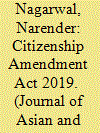

|
|
|
|
|
| Summary/Abstract |
The primary endeavor of this paper is to illuminate the contentious Citizenship Amendment Act 2019 through the constitution and human rights jurisprudence perspective. In this paper, an attempt has been made to propose a different interpretation of the Citizenship Amendment Act 2019 which not only infracts constitutional values but also legalized the hate against minorities, especially Muslims. India—as a nation state—has always cherished and remained concerned about its secular and democratic character. Since independence, India has maintained its global position as a responsible and humane society to protect minorities’ rights and social justice. Shockingly, the legislative development that had taken place in the recent past has questioned India’s commitment toward the certain principle of human rights, democratic values, and secularism which are the hallmark of the Constitution of India. The Citizenship Amendment Act 2019 has put religion as a pre-requisite qualification if someone is desirous to apply for Indian citizenship which is purely a violation of the basic ethos of the constitution. The idea of India as envisioned by the framers of the Indian constitution as a democratic, secular, and socialist state and anything that contrary to its basic structure is unconstitutional. The contentious legislation whether unconstitutional or not needs to be examined through the prism of constitutional law and fundamental norms of human rights. In this research exercise, a modest attempt is made to examine all merits and demerits of this antagonistic citizenship legislation. Throughout the paper, the effort has been given to sustain the notion that India cannot be a republic founded on discrimination, hate, and a pervasive sense of fear.
|
|
|
|
|
|
|
|
|
|
|
|
|
|
|
|
| 8 |
ID:
112742
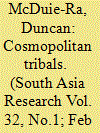

|
|
|
|
|
| Publication |
2012.
|
| Summary/Abstract |
Based on fieldwork, this article examines various aspects of tribal migration from the Northeast frontier of India to Delhi, a phenomenon which increased rapidly in the last half decade or so. This offers insights into four important interlinked processes. First, such migration indicates significant changes taking place in the Northeast itself. While many migrants leave the region to escape conflict, many more simply seek to find work, pursue education and fulfil changing aspirations. Second, tribal migration to Delhi reveals the ways in which the city itself has been changing. While tribal migrants search out employment opportunities in neoliberal capitalist spaces, employers in such spaces have specific reasons to desire tribal labour, particularly in shopping malls and call centres. Third, tribal migrants encounter racism and discrimination in Delhi and their experiences reveal how racial issues function and are debated today within India. Fourth, tribal migrants themselves embody the dramatic discord between the ways tribals see themselves and the ways they are perceived in India.
|
|
|
|
|
|
|
|
|
|
|
|
|
|
|
|
| 9 |
ID:
160072
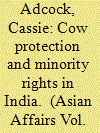

|
|
|
|
|
| Summary/Abstract |
Recent efforts to prevent cow-slaughter in India have prompted U.S. concern about violations of religious freedom. But although the politics of cow protection poses a significant threat to disadvantaged groups in India, efforts to ameliorate that threat through an international policy of religious freedom also carry serious risks. This paper reviews reports issued by the U.S. Department of State's Office of International Religious Freedom and by the U.S. Commission on International Religious Freedom. It argues that by unnecessarily portraying the politics of cow protection in terms of a stark conflict between Hindus and Muslims, they threaten to undermine the goal of reducing anti-minority discrimination and violence in India.
|
|
|
|
|
|
|
|
|
|
|
|
|
|
|
|
| 10 |
ID:
148512
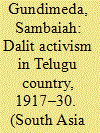

|
|
|
|
|
| Summary/Abstract |
This article argues that the politics of lower castes and their struggles for social equality and political representation cannot be effectively subsumed under a homogenous non-Brahmin category. Contesting the argument that the mobilisation of the lower castes/non-Brahmins in southern India was organised around the ideology of Dravidianism, this research examines what is today called Dalit activism in the Telugu country, related to the ideology of Adi-Dravida/Adi-Hindu. It also identifies discrimination of Dalits as well as between Dalits, in times before Gandhi and Ambedkar appeared on the scene.
|
|
|
|
|
|
|
|
|
|
|
|
|
|
|
|
| 11 |
ID:
112732
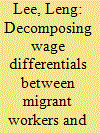

|
|
|
|
|
| Publication |
2012.
|
| Summary/Abstract |
This paper looks at wage discrimination faced by China's rural-urban migrants. Using data from the China Urban Labour Survey, it uses standard wage decomposition techniques to measure the extent wage gaps between migrants and locals are attributable to migration. Because the survey covers five cities, the results allow for an investigation regarding how much variation in discrimination there is. Unlike previous studies of wage discrimination in China, this research includes a more full measure of remuneration by including non-financial benefits as well as bonuses earned. The results suggest that migrants still face a significant amount of discrimination, but that this varies a lot between cities.
|
|
|
|
|
|
|
|
|
|
|
|
|
|
|
|
| 12 |
ID:
185748
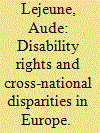

|
|
|
|
|
| Summary/Abstract |
Europeans with disabilities continue to face lack of opportunity in areas including education and employment. The extent of such disparities, and policies to address them, vary across the member states of the European Union. In 2000, an EU directive on employment equality set antidiscrimination rules, including requirements for employers to offer reasonable accommodations to disabled workers, that were subsequently adopted by member states. But a comparison of disability policy in France and Sweden shows that divergent approaches to labor rights remain in place, with France relying on quotas while Sweden offers job training programs.
|
|
|
|
|
|
|
|
|
|
|
|
|
|
|
|
| 13 |
ID:
159231
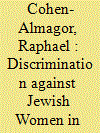

|
|
|
|
|
| Summary/Abstract |
Democracy is supposed to allow individuals the opportunity to follow their conception of the good without coercion. Generally speaking, Israel gives precedence to Judaism over liberalism. This article argues that the reverse should be the case. In Section I it is explained what the Halachic grounds for discrimination against women are. Section II concerns the Israeli legal framework and the role of the family courts. Section III considers Israeli egalitarian legislation and groundbreaking Supreme Court precedents designed to promote gender equality. Section IV analyses inegalitarian manifestations of Orthodox Judaism in Israeli society today, especially discriminatory practices in matters of personal status. It is argued that Judaism needs to adopt gender equality because of Israel’s commitment to human rights. Israeli leaders should strive to close the unfortunate gap between the valuable aims and affirmations voiced in the 1948 Declaration of Independence and the reality of unequal political and social rights for women.
|
|
|
|
|
|
|
|
|
|
|
|
|
|
|
|
| 14 |
ID:
111863
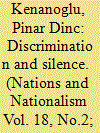

|
|
|
|
|
| Publication |
2012.
|
| Summary/Abstract |
In 1974, the dispute between Turkey and Greece over Cyprus resulted in Turkish military intervention in the island. The same year, the Turkish Court of Cassation issued a legal decision that rendered possible the confiscation of properties belonging to minority foundations in the years to come. I argue that the case of minority foundations in 1974 was not a coincidence but a conscious reciprocal discrimination applied in both official and unofficial spheres. I support my argument with the following indicators: (1) the wider historical Greek-Turkish conflict and its 'reciprocal' nature of discrimination against non-Muslim minorities; (2) the laden interpretation of the non-Muslim minorities as the internal enemies in the Turkish mind-set and its direct reflections on the 1974 case of foundations; and (3) the nature of the press coverage, which I assess using detailed reading and content analysis of three Turkish newspapers (Hürriyet, Tercüman, Cumhuriyet) and one Rum minority newspaper (Apoyevmatini).
|
|
|
|
|
|
|
|
|
|
|
|
|
|
|
|
| 15 |
ID:
114604
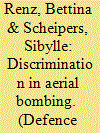

|
|
|
|
|
| Publication |
2012.
|
| Summary/Abstract |
This article questions the notion that the norm of discrimination in air
warfare has become increasingly relevant among Western publics, policy-makers and the military in the course of the 20th century. The article offers a critique of the existing literature, which tends to
overemphasise the contrast between the largely indiscriminate use of air
power in World War II on the one hand and the greater restraint in air
strikes in armed con?icts in the second half of the 20th century on the
other. This critique will be underpinned by six short case studies discussing the uses of air power in limited con?icts from the 1920s to-today. The ?ndings indicate that the norm of discrimination had a great
salience in small wars ever since the emergence of air power
|
|
|
|
|
|
|
|
|
|
|
|
|
|
|
|
| 16 |
ID:
099410
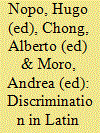

|
|
|
|
|
| Publication |
Washington, DC, World Bank, 2010.
|
| Description |
xxv, 308p.
|
| Series |
Latin America development forum series
|
| Standard Number |
9780821378359
|
|
|
|
|
|
|
|
|
|
|
|
Copies: C:1/I:0,R:0,Q:0
Circulation
| Accession# | Call# | Current Location | Status | Policy | Location |
| 055309 | 305.80098/NOP 055309 | Main | On Shelf | General | |
|
|
|
|
| 17 |
ID:
103234
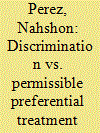

|
|
|
|
|
| Publication |
2011.
|
| Summary/Abstract |
This essay analyzes the allocation policies enacted by Haifa University over its dormitories. While seemingly a trivial case, it is actually a key example of an ongoing legal and social struggle between Arab and Jewish citizens of Israel. The policy provides preferential treatment for veterans of IDF and national service. Adalah challenged this policy in an Israeli court which accepted the petition. However, the legislation was later changed to allow such preferential treatment. This article examines two issues: national service for Arabs, and the preferential treatment practised by Haifa University I will argue that both opening national service for Arabs, and the policy of Haifa University are justified, however, the analysis will demonstrate the complexity of both subjects, and the article concludes with suggestions for both issues.
|
|
|
|
|
|
|
|
|
|
|
|
|
|
|
|
| 18 |
ID:
185596
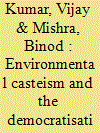

|
|
|
|
|
| Summary/Abstract |
Mainstream Indian environmental movements and academic environmental histories, embedded in casteism, have overlooked the inequitable distribution of natural resources, leaving the ecological crisis facing Dalits unaddressed in both scholarly discourse and public arenas. This study aims to scrutinise the casteisation of natural resources and Dalits’ socio-ecological precariousness in two Dalit self-narratives—Baby Kamble’s The Prisons We Broke and Bama’s Karukku. We seek to deconstruct and transform narratives about environmentalism in India, which can best proceed through the active and progressive intervention of the insecure social classes (mainly Dalits). In doing so, the study will throw light on egalitarian eco-consciousness in Dalit narratives, and highlight Dalit voices as fundamental to shaping post-colonial ecocriticism.
|
|
|
|
|
|
|
|
|
|
|
|
|
|
|
|
| 19 |
ID:
178889
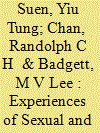

|
|
|
|
|
| Summary/Abstract |
While China's Constitution says everyone is treated equally before the law, employment discrimination continues to exist. This paper breaks new ground by analysing a quantitative survey of more than 10,000 lesbian, gay, bisexual, transgender and intersex (LGBTI) people, the largest dataset of its kind to date in China. Only 5.1 per cent of respondents were completely open about their gender and sexuality at work. More than one-fifth reported experiencing negative treatment in the workplace. Transgender and intersex people reported higher rates of negative treatment, as did respondents with lower educational levels and lower incomes and those residing in towns. Employer policies against discrimination were rare, but when in place, they were significantly associated with less negative treatment. These findings highlight an almost completely neglected segment of the workforce and document discriminatory experiences that could be addressed by changes in discrimination law and by employer policies and practices related to diversity and inclusion.
|
|
|
|
|
|
|
|
|
|
|
|
|
|
|
|
| 20 |
ID:
185604
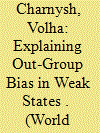

|
|
|
|
|
| Summary/Abstract |
Two dominant explanations for ethnic bias in distributional outcomes are electoral incentives and out-group prejudice. This article proposes a novel and complementary explanation for the phenomenon: variation in legibility across ethnic groups. The author argues that states will allocate fewer resources to groups from which they cannot gather accurate information or collect taxes. The argument is supported by original data on state aid from the 1891/1892 famine in the Russian Empire. Qualitative and quantitative analyses show that districts with a larger Muslim population experienced higher famine mortality and received less generous public assistance. The Muslims, historically ruled via religious intermediaries, were less legible to state officials and generated lower fiscal revenues. State officials could not count on the repayment of food loans or collect tax arrears from Muslim communes, so they were more likely to withhold aid. State relief did not vary with the presence of other minorities that were more legible and generated more revenue.
|
|
|
|
|
|
|
|
|
|
|
|
|
|
|
|
|
|
|
|
|